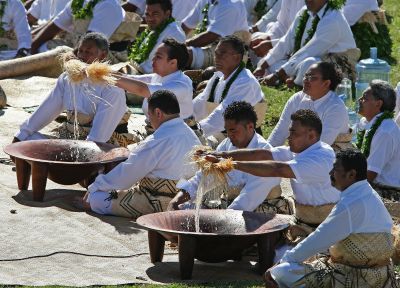Kava the drink of choice in laid-back Pacific

Kava may be one of the secrets behind the famously laid-back Pacific islands lifestyle but Taulelei Uilelea claims the mildly narcotic drink can also be credited for his success in chess.
At Savalalo market on Samoa's main island of Upolu, the regular kava circle will host at least eight people on most days, but at busy times on a Saturday there may be many as 20.
The drinkers gather on bench seats formed in a circle and are served by young men who make the brew.
"At one tala (dollar) a seating, it ain't bad for a day of fun," Uilelea says.
Uilelea is also a member of the market's chess circle and insists he always plays better after a bowl of kava.
"Kava is needed to take the tension away," Uilelea said, adding the goal is relaxation rather than inebriation.
Made from the pounded roots of the kava (piper methysticum) plant, the drink remains after thousands of years the focus of social and cultural life in many Pacific island nations.
At the Salelologa market on Samoa's other main island of Savaii, Kilisi Tiatia also values kava's calming effect, frequently joining the kava circle to catch up on local news and gossip.
"It's really about relaxing, taking it easy and then sharing stories," said Tiatia, who has been part of the kava circle for 20 of his 41 years.
Kava ceremonies are also at the centre of the most important cultural events on many islands, used to reinforce the social order and welcome important guests.
The coronation of Tonga's King Siaosi Tupou V last year became global news with its extravagant European pageantry, including pages in silk knee breeches, ermine capes and imperial brass music.
But in local eyes, the ceremony that counted most was the earlier traditional kava rite in which nobles and chiefs pledged obedience to their new king around the kava bowl.
More than 200 of the country's chiefs gathered in a huge circle around dozens of slaughtered pigs, hundreds of food baskets and other gifts to the new monarch.
The king, whose traditional title dates back to the 17th century, drank the first bowl of kava to confirm his authority over the tiny nation of 110,000.
In Fiji, visitors to villages are still expected to present a bundle of kava roots to the local chief to ensure a friendly reception and hospitality.
Kava is found in most of the islands of Polynesia and Melanesia, as well as parts of Micronesia in the northern Pacific.
In Samoa it is called 'ava, in Fiji, yaqona, and in the state of Pohnpei in the Federated States of Micronesia, sakau.
The Melanesian nation of Vanuatu may be the original home of the kava plant and it still claims to produce the best, although growers on other islands usually beg to differ.
Traditionally, young girls or boys would chew the roots to a pulp before the kava was made. Today the roots are pounded into a powder which is mixed with water and sieved before serving.
The effects on the drinker include a mild numbing of the tongue and lips, sociability, calmness and a sense of well-being.
The sedative effect means that unlike alcohol drinking, kava sessions rarely end in violence.
Some foreigners who have tried kava describe it as looking and tasting like muddy water, although it has been gaining popularity in tablet form as a mood-enhancing natural remedy in some developed countries.
A study at Australia's University of Queensland this year found kava to be effective in treating anxiety.
The study of 60 people - in which half were given kava tablets and half a placebo - found the drink had a beneficial effect on wellbeing.
"We found the people taking the kava did have a very strong anxiety reducing effect and we also found their mood was elevated significantly," study leader Jerome Sarris told AFP.
Sarris said there were no indications during the trial of any adverse health problems from the water-soluble extract of kava, although there have been concerns about the effects of heavy, long-term use.
The mood-enhancing effects of kava were increasingly recognised in developed countries in the 1990s and by the beginning of the current decade kava exports from Pacific countries had grown to around 200 million US dollars a year.
Kava extract pills gained wide popularity in western markets including Europe - especially Germany - and the US until reports of a few cases of severe liver problems in users saw bans introduced in Europe in 2002.
Exports were slashed overnight, although subsequent tests have suggested that the problems could lie with the use of ethanol or acetone to extract the active ingredient from the plant and the use by some manufacturers of parts other than the roots.
Despite the controversy, kava extracts have been gaining in popularity in the US, and in recent years a number of fashionable kava drinking lounges have opened there.
But the debate means little to the kava drinkers at Salelologa market.
"I see the kava circle as a meeting place for me and my friends from all over the island. Sometimes there's new people, but the same old guys stay until they die, then the new generation of kava drinkers emerge," Tiatia said.
Join our commenting forum
Join thought-provoking conversations, follow other Independent readers and see their replies
Comments
Bookmark popover
Removed from bookmarks